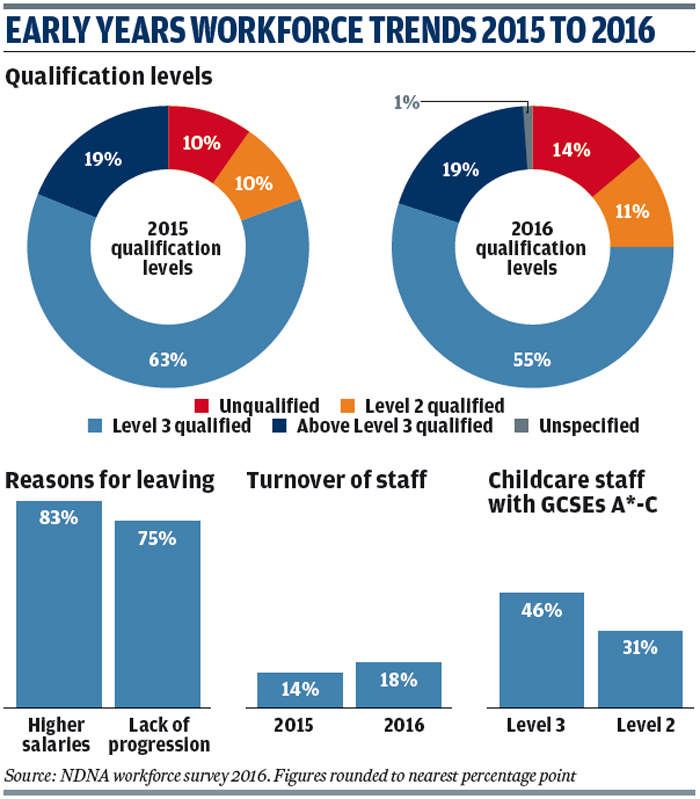Qualifications change escalates childcare recruitment crisis
Jess Brown
Tuesday, October 25, 2016
Annual workforce survey of early years leaders shows higher staff turnover and falling qualification levels as a result of new GCSE requirements, leading to concerns there will be too few practitioners to deliver 30-hour offer.

The National Day Nursery Association's (NDNA) annual national workforce survey lays bare the scale of the recruitment crisis in the childcare sector.
Representing the views of 278 nursery owners and managers, the 2016 survey reveals early years providers are struggling to cope with rising staff costs and difficulties recruiting and retaining practitioners, which could have significant implications for the ability of the sector to deliver planned government reforms.
Recruitment and retention
There was an 18 per cent turnover of the early years workforce in 2015/16, an increase from 14 per cent in 2014/15. NDNA found that 59 per cent of those who have left the sector have done so due to lack of progression - and cites new requirements around academic qualifications as a key factor.
As of September, Early Years Educator (EYE) Level 3 apprentices must have at least C grades in English and maths GCSE upon qualifying in order to count in a settings' staff-to-child ratios - those with Level 3 qualifications can take on more responsibilities and look after more children.
But the survey shows only 46 per cent of those qualified to Level 3, while 31 per cent of those at Level 2 achieved the required GCSE grades.
At Advantage Day Nursery in Surrey, manager Hazel Moody says she has seen a "huge" decline in Level 3 apprentices locally.
"We used to have an influx of students coming from college who had just qualified and were looking for positions," she says.
"We don't get that any more as numbers in local colleges have dropped dramatically. This avenue of getting good staff has gone."
The nursery currently employs five staff qualified to a EYE Level 2.
"They are struggling to do their GCSEs, which, at the moment, means they're never going to get their Level 3 qualification. They're practicing at Level 3, but can't get recognition for it on paper. We might lose them altogether from childcare as they're disillusioned," Moody says.
Debbie Clarke, director of Little Rascals, a pre-school and nursery in Tunbridge Wells, says contributing to the problems is training providers refusing to take learners on without them already having their GCSEs, effectively making the requirements entry, rather than exit, ones.
"Training companies insist learners have maths and English before they start because they're not guaranteed the income if they do not get their maths and English during the qualification," she says.
The nurseries work with five training companies, but only two are willing to take learners through their GCSEs.
She says a member of staff at Little Rascals has taken her maths GCSE twice, and failed both times.
"She's completed Level 3, but we can't count her as Level 3. We've employed her because she's a good practitioner, but we're paying her minimum wage for being Level 2," Clarke says. "She's frustrated because we have very strict rules on what qualified staff can and can't do - all because she can't get algebra and trigonometry. But she's one of the best practitioners we have."
The survey shows other nursery leaders are experiencing similar problems to Moody. A total of 58 per cent of settings say recruiting Level 3 staff is difficult or very difficult. The sector has seen a drop in numbers of Level 3-qualified staff from 63 per cent in 2015 to 55 per cent in 2016.
Overall, workforce qualifications have fallen from 83 per cent in 2015 to 75 per cent this year, the first time since the NDNA's first survey in 2013 that the sector has seen a decline in standards.
Meanwhile, the number of staff with no qualifications has risen from 10 per cent to 14 per cent over the same period.
The situation has led to calls for the GCSE requirements to be scrapped in favour of a system of assessing "functional skills" - a move supported by two-thirds of practitioners (see expert view).
Stella Ziolkowski, NDNA's director of quality and workforce development, says the decline in the number of qualified staff will risk settings' ability to deliver 30 hours of free childcare when it begins in September 2017.
The survey found 86 per cent of leaders said recruitment difficulties would affect their ability to deliver the free entitlement.
"Numbers of qualified staff are dropping too low, which will have a detrimental impact on the quality of early years education, the single most important factor in reducing the attainment gap and supporting children to achieve," Ziolkowski says.
"Unless the current double whammy of staff leaving and few staff applying for practitioner positions is addressed urgently, we risk that there won't be enough nursery places to be able to deliver the 30 hours free childcare promise.
"We urge the new childcare minister, Caroline Dinenage, to change the GCSE requirement to one for practical everyday maths and English as part of her promised early years workforce strategy to ease this escalating crisis.
"Quality, experienced candidates without GCSEs at these grades must be allowed to demonstrate their skills and knowledge to support our children to reach their full potential."
Staffing costs
Many employers are worried about rising costs, including having to use agency staff to cover vacancies and workforce shortages, as well the impact on payroll costs of the introduction of the National Living Wage in April 2017.
Little Rascals, which employs 74 staff, has seen its costs increase as a result of struggling to fill seven staff vacancies.
Clarke says she has seen a decline in EYE apprentices. "If we advertised an apprenticeship vacancy, we could have up to 90 people apply. Now, we're lucky if we get 10," she says.
"Before, we'd expect 30 per cent of staff to be modern apprentices. We've had to take on more qualified people, so our wages have gone up by at least 25 per cent. We're having to get agency staff in, which is a costly way of doing things."
Rising costs were cited by survey respondents as one of the main reasons their setting had insufficient continued professional development for staff.
Almost a third of respondents reported having a reduced budget for training for 2016/17. The main reasons for this were providers disinvesting in training in preparation for the higher costs associated with the living wage and 30-hour offer.
The survey revealed employers were increasingly using online and in-hour training to save money.
It also raised concerns around training for special educational needs (SEN), which was most commonly cited as difficult to access.
Five per cent of providers reported having no staff with training in SEN, and only 55 per cent of employers have access to sufficient training in SEN.
NDNA recommendations
The NDNA calls on the government to ensure that its promised workforce strategy, set to be published in late autumn, is clearly costed and takes into account funding shortfalls for the delivery of 30 hours and the National Living Wage increases.
It recommends that the government should invest in supporting the sector to improve workforce development, with a particular focus on supporting children with special needs.
It also urges the government to change the GCSE requirements in maths and English, and to accept functional skills.

Expert view: Functional skills must replace gcse requirements now to improve recruitment and staff retention
By Mark Dawe, chief executive, Association of Employment and Learning Providers (AELP)
The NDNA survey results come as no surprise to the training providers who support childcare settings in achieving and sustaining their qualified teachers ratio.
For months, AELP has been saying that the insistence on good GCSEs for Early Years Educator Level 3 qualifications has been immensely damaging for sector recruitment and threatens to undermine the manifesto commitment to double the amount of free childcare available to working parents. The NDNA survey confirms what an impact it is having on staff retention, too, because childcare workers can't progress without GCSEs.
We and others in the sector have therefore been pressing the government to recognise attainment in functional skills as an alternative to GCSEs in common with most other sectors. We all recognise the importance of English and maths, and this is an excellent example of it needing to be the right English and maths.
Shortly before Theresa May became Prime Minister, the Department for Education finally ordered a review into the issue, but we've said to the new ministerial team at DfE that they should change policy immediately to allow recognition of functional skills before any more damage is inflicted on such an important sector, and then respond to any review recommendations later.
With the apprenticeship levy due to begin next April, the EYE apprenticeship standard has been lying unapproved by the government for some months, even though the sector employers leading the Trailblazer pilot have made clear their wish for the recognition of functional skills. Given the levy timetable, it is vital that the government rectifies this as soon as possible. The vast majority of approved apprenticeship standards allow for attainment of functional skills as an element of programme completion, so why is early years treated differently?
Nationally, the GCSE retake pass rate is not good (27 per cent for English and 30 per cent for maths) and the childcare sector relies heavily on young recruits. This year's results were a body blow for many of the students who took them, and hitting these students over the head with the same form of learning and assessment is not the way forward.
Insistence on GCSEs as part of a training programme can be damaging for the whole learning experience. For the sector to avoid a full-blown crisis, an urgent change of policy is needed now.




